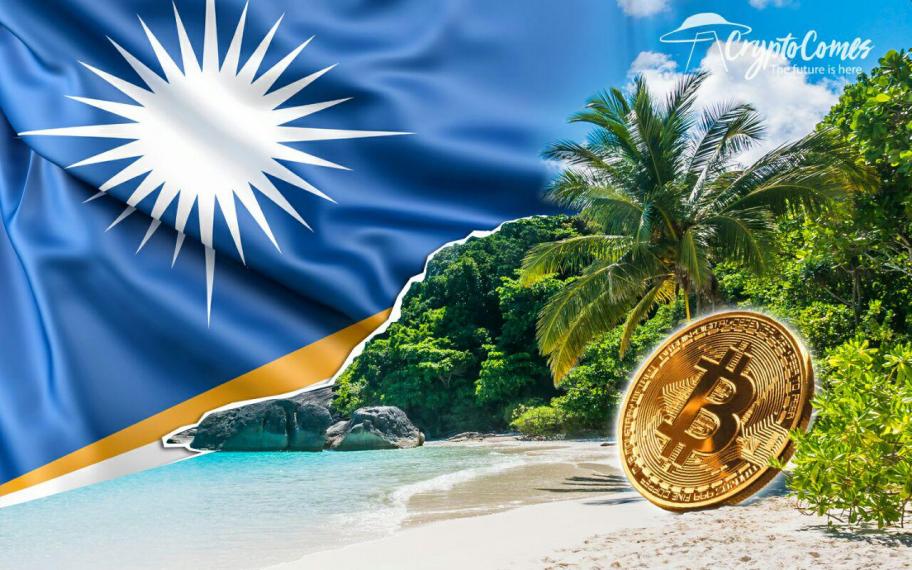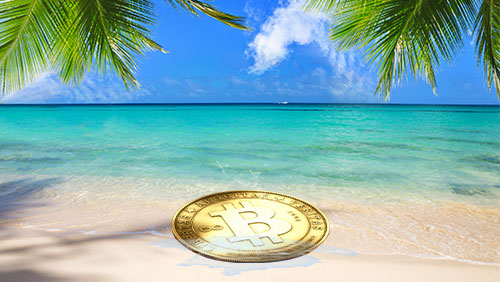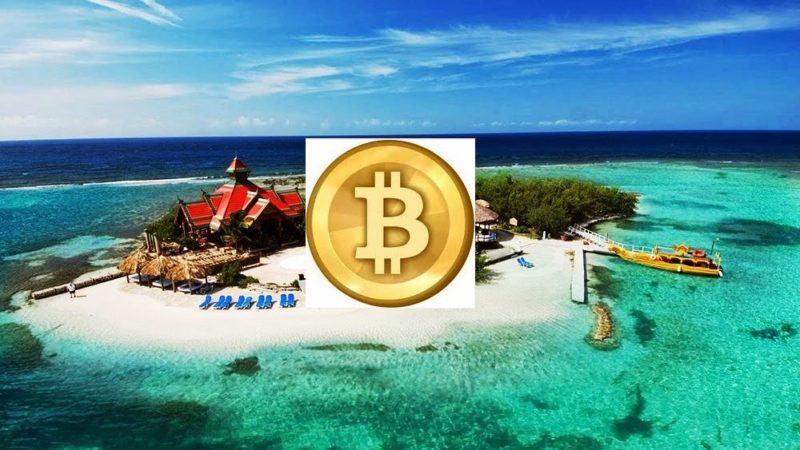Marshall Islands To Adapt Crypo-currencies Despite IMF Warning
The International Monetary Fund (IMF) has advised against the Republic of the Marshall Islands’ plan to introduce a digital currency as a second legal tender alongside the U.S. dollar. Marshall Islands To Adapt Crypo-currencies Despite IMF Warning
The Marshall Islands – a remote chain of islands in the central Pacific – passed a law on the issue in February, aiming for the planned “Sovereign” cryptocurrency to boost the local economy and counter the increasing risks of the nation becoming disconnected from the global financial system.

However, following a period of consultation with officials from the islands, the IMF published a paper on Monday advising against the move. According to the paper, the Marshall Islands economy is now “highly dependent” on external aid, as the country faces constant climate change and natural disasters.
The only domestic commercial bank in the country is now “at risk of losing its last U.S. dollar correspondent banking relationship (CBR) with a U.S.-based bank,” due to tightened due diligence across financial institutions in the U.S.
The IMF argued that the introduction of a cryptocurrency as legal tender may backfire, if a lack of comprehensive anti-money laundering measures eventually leads to the U.S. bank cutting ties with the country.
The IMF Continued:
“In the absence of adequate risk mitigating measures, the issuance of a decentralized digital currency as a second legal tender would not only increase macroeconomic and financial integrity risks but elevate the risk of losing the last U.S. dollar CBR.”
Should that happen, “external aid and other flows could be disrupted, which would result in a significant drag on the economy,” it argued.
While the IMF is specifically advising in this case on the social and monetary systems in the Marshall Islands, it perhaps offers a window into the thinking of the global monetary organization on whether cryptocurrencies should be elevated to the status of legal tender in the traditional financial system.
The paper also follows recent remarks made by IMF officials who argued that the rapid growth of crypto assets poses a threat to the demand for fiat currencies.
As such, they argued that central banks should raise their game, adopting desirable features of cryptocurrencies to better compete with the nascent technology – a move described as “fight fire with fire” by the IMF chief Christine Lagarde.

Unbanked: What Happens When a Country Is Financially Cut Off? (Got Bitcoin?)
Cash is king in the Marshall Islands as complex banking rules scare away foreign partner bank.
What happens to a country if it loses access to the world’s money?
On the Marshall Islands–a chain of volcanic islands in the middle of the Pacific Ocean, population 53,066—the only homegrown bank can’t issue credit cards, doesn’t have any ATMs and sends well-worn dollar bills between its island branches by boat. But it had been able to let islanders send and receive money from abroad through a link with Honolulu-based First Hawaiian Bank.
Now, it is in danger of losing that crucial financial tie to the outside world as First Hawaiian, a unit of France’s BNP Paribas, prepares to close down all business with the Bank of the Marshall Islands. Without an international banking relationship, the bank gets cut off from a number of services, not just from handling international money transfers but also cashing paychecks from one of the island’s largest employers—the U.S. military base.
The closure is a side effect of stricter banking rules to prevent money laundering and terrorism financing. Banks are especially wary of exposure to small Pacific nations that struggle to meet complex regulatory demands. International banks have also pulled out of Fiji, Samoa and Tonga and the use of cash across the Oceania region is rising, according to the International Monetary Fund.
Banks make at best scant profits from tiny markets like the Marshall Islands, the world’s fourth-smallest economy. Spread over an area roughly the size of Indonesia and vulnerable to rising sea levels, the country uses the dollar as its currency and is highly reliant on U.S. assistance.
First Hawaiian, which doesn’t have any branches on the Marshall Islands but has acted as an intermediary for the country’s bank, hasn’t found evidence of illegal financial activity but now views the business risk of its long-distance relationship as too high, according to people briefed on the matter. BNP officials have declined to comment on the bank’s decision and when exactly the exit will occur.
The process of moving money into the country is already circuitous. When Albious Latior wants to send money from Springdale, Ark.—home to Tyson Foods and a contingent of Marshallese—to his brother in Ebeye, the country’s second most populous area, he first has to wire it via Western Union to relatives in Majuro, the capital. They then transfer it via the domestic bank to his brother in Ebeye.
Ebeye’s only venue for international transfers has been a MoneyGram branch tied to the domestic bank. During tax season, there can be a line of 100 people outside, says Ramanty Chong Gum, a 34-year-old high school math teacher on Ebeye. The MoneyGram already restricts the number of transactions for each customer; with First Hawaiian’s exit, that channel will be cut off altogether.
“People think you just put money in and it comes out the other side,” said Brad Windbigler, Western Union senior vice president and treasurer. “Most banks are still very national or tied to a specific region. So most banks need to deal with another bank to move money.”
Unlike MoneyGram, Western Union can continue to operate in the Marshall Islands, as it bypasses the nation’s financial system by working through the Bank of Guam, which has one branch in Majuro. But for anyone on Ebeye, receiving money through Western Union means either using a middleman or taking a flight or a long boat ride 275 miles to the capital.
Workarounds abound. Marshallese lucky enough to have debit cards issued by a foreign bank can ask friends who work on the U.S. military base on Kwajalein Atoll, where there is a bank operated by Bank of America (only American military personnel can open accounts there) to withdraw money for them. Card holders give their cards and pin numbers to friends who work on the base. Those without cards make deals with those who do. Favors often involve a “tip” for the helper.
“We give them a little extra on the side for their assistance,” said Ms. Chong Gum.
In the absence of credit cards, mom-and-pop stores keep a log of transactions on credit until paychecks arrive, issuing cash for any remaining balance.
Many Marshallese stock up on food before leaving the country, as United Airlines, the one carrier that flies out of Majuro to the U.S., no longer accepts cash on board. “I’ve known some families who traveled here, and they couldn’t eat on the flight back,” said Lacutshirts Hosia, a photographer in Majuro.
None of this will get easier if First Hawaiian withdraws. The IMF and other agencies are now trying to help the Bank of the Marshall Islands get in compliance with the new rules.
“For a little country like this and for the small banking community there, this has been overwhelming,” said Andrew Spindler, president of the Financial Services Volunteer Corps, a New York-based nonprofit that has been working with Marshall Island officials.
“The tide has been rising over the last 10 to 15 years about what banks expect from each other,” said Adam Szubin, who has led efforts to combat terror financing and money laundering at the U.S. Treasury Department. “And that has excluded some peripheral banking systems that just haven’t caught up.”

Officials agree that the financial isolation and the trend toward cash come with their own risks.
An inability to make international payments means it’s harder for businesses to settle trade deals and potentially diverts funds into shadow-banking channels, according to the Financial Stability Board, an international body that monitors the global financial system.
In addition, access to outside capital is crucial to fighting poverty in the emerging world, said Robert Mosbacher Jr. , former president of the Overseas Private Investment Corp., a U.S. government agency that helps American businesses invest in emerging markets.
In a desperate measure earlier this year, the Marshall Islands announced it would launch a cryptocurrency, a move financial experts say won’t solve its banking woes.
Carolina Claver, senior financial-sector expert at the IMF, said at the fund’s annual meeting that it’s difficult to blame banks for leaving minuscule markets. “It is a business decision,” she said. “But on the other hand, you cannot exclude completely a country because it is small.”

“Everybody’s using cash and that’s bad for anti-money laundering,” says Sultan Korean, banking commissioner for the Marshall Islands.
Updated 1-29-2019
Swiss Startup To Produce ‘Banknotes’ For Marshall Islands’ Official Cryptocurrency
Switzerland-based crypto hardware wallet maker Tangem says it has been selected by the Republic of the Marshall Islands to produce the “physical blockchain notes” for the nation’s planned national digital currency.
Tangem announced the news Monday, saying the blockchain notes will be used to store the republic’s Sovereign (SOV) digital currency, which is being launched as an alternative legal tender in the country. Once issued, the SOV will be officially accepted alongside the U.S. dollar.
Described as “controllable mechanism of currency issuance and circulation for the state,” the notes take the form of a physical card that is secured with a blockchain-enabled microprocessor. They offer “immediate” transaction validation, zero fees and requiring no internet connection to use, according to the firm.
David Paul, minister-in-assistance to the president of the Marshall Islands, said in the announcement:
“Tangem will help us ensure all citizens, including those living on more remote outer islands, are able to easily and practically transact using SOV.”
The Marshall Islands first announced its plans to issue SOV as a legal tender in February of last year, when it passed the Declaration and Issuance of the Sovereign Currency Act allowing the move in law. Neema, an Israeli startup that facilitates international money transfers via an app, was said at the time to be developing the underlying tech for the new cryptocurrency using a public protocol called Yokwe.
The plan has seen some pushback, however. In September 2018, the International Monetary Fund (IMF) advised against the plan to introduce the SOV, stating that if it happened, “external aid and other flows could be disrupted, which would result in a significant drag on the economy.”
Last week, Tangem received a $15 million investment from Japanese financial services giant SBI Group, Through the funding, the firm said it plans to expand its card technology to other areas, such as stablecoins, initial coin offerings, tokenized asset offerings, digital identity and more.
Updated: 9-5-2019
Marshall Islands Official Explains National Crypto With Fixed Supply
An official from the Marshall Islands has published an essay explaining the country’s national cryptocurrency project ahead of the Invest: Asia 2019 conference.
The issuance of the Marshallese sovereign (SOV) was discussed in an essay by The Honorable David Paul — Minister In-Assistance to the President and Environment of the Marshall Islands — published by Coindesk on Sept. 4.
“Connected to the global financial system on its own terms”
The Marshall Islands had passed a Sovereign Currency Act in 2018, declaring its intent to release its new national digital currency. The nation, which has been independent since 1979, has until now been using the United States dollar as the official currency for all payments, debts, public charges, taxes and dues.
The state’s reliance on U.S. grants is estimated to total around $70 million each year, as Cointelegraph reported earlier this year.
In his essay, Minister Paul outlines that the Islands’ choice to issue a second legal tender based on blockchain technology was based on a conviction that centralized solutions are not workable in a country of a little over 50,000 people spread across over 1,000 Pacific islands.
Beyond Decentralization, blockchain offers the country the possibility of having compliance “baked into the currency protocol itself,” — in the minister’s words — “while maintaining privacy for individuals.”
The technology, he notes, allows the state to automate much of its compliance obligations, lowering the costs associated with existing systems and thus helping it take a more proactive role in the global fight against money laundering and financing of terrorism.
Approved Entities — such as banks or exchanges — will be tasked with verifying the identity of SOV users, thereby closing anonymity loopholes. Yet, the minister writes, the country will aim to protect financial privacy as far as possible, arguing that:
“It is crucial that individual users should have a reasonable expectation of privacy – specifically, the ability to choose when to disclose your information, what exactly to share, and with whom.”
Governments need not treat money as a “limitless resource”
Minister Paul outlines that the SOV will have a fixed, tamper-proof money supply and that its growth will be predetermined at 4% per year. He argues that:
“We chose to create a fixed money supply with fixed growth because fiat currencies can be remarkably unstable. […] The policies of major central banks are not reassuring, as the gold and bitcoin prices attest. We as governments need to take a more sustainable approach to money, and not treat it as a limitless resource.”
Other aspects of the essay point to the fact that fiat remittance services are currently extremely expensive for citizens, something that frictionless blockchain-based systems can help mitigate.
As recently reported, China is now readying itself to launch a central bank-backed, blockchain-based digital currency for use in retail scenarios.
Updated: 6-6-2020
Marshall Islands Seeks To Establish A ‘Self-Sovereign Identity’ With New Blockchain-Based Currency
Joel Telpner reveals some of the steps the Marshall Islands is taking to launch its national digital currency.
The Marshall Islands’ project says its creation of a digital sovereign currency, named SOV, aims to be a “game-changer”. It could also pioneer how governments respond to crises such as the COVID-19 pandemic.
In an exclusive interview with Cointelegraph, Joel Telpner, chairman of Sullivan’s Fintech and Blockchain Practice and Marshall Islands crypto advisor, highlighted that the project still faces “a lot” of challenges ahead, but looks forward to making the work “rewarding.”
The Current Phase Of SOV’s Project
Telpner said that the Islands’ government is currently in an 18 month phase. They’ll be issuing what’s called “preSOV,” which will later convert into SOV. He states:
“That 18-month period allows us to issue the preSOV in stages and specify the amounts to test the infrastructure while we’re doing it so while preSOV is coming into the market, we’ll be able to test the network, we’ll be able to test the blockchain. We’ll test all the regulatory and compliance provisions, and we’ll be able to test the technology.”
The Sovereign Currency Act of 2018 passed on February 26, 2018, allowing the nation to start developing its digital currency project.
As for the preSOV, the lawyer says they’re hoping to begin issuing the preliminary token within “the next couple of months”. They admit that they still need to refine the way cryptocurrency is presented to people who don’t have a technology background.
Telpner Clarified:
“What the Marshall Islands decided to do was to instead of issuing the currency all at once, which when you’re launching a legal tender, putting it in the market all at once is not a good idea.”
Marshall Islands Could Be Referenced By Other Small Nations
The Marshall Islands’ SOV advisor also spoke about how the project can be a reliable reference for other countries who want to follow the same path. They believe that “this is a good way for the government to empower the people of their country” and to create a “self-sovereign identity.”
On The Role That These Types Of Digital Currencies Could Play Amid The Covid-19 Crisis, Telpner Commented:
“Think about how much better and more efficient it would have been if we had a digital currency combined with a self-sovereign identity that would have allowed the government to quickly and efficiently get those payments of people that we’re entitled to them.”
However, Telpner Says That The Digital Currency Does Not Have To Rely Specifically On Blockchain Technology:
“Whether or not blockchain solutions become a favored form of creating, issuing, and distributing digital currency, I think, is yet to be seen.”
Go back
Leave a Reply
You must be logged in to post a comment.